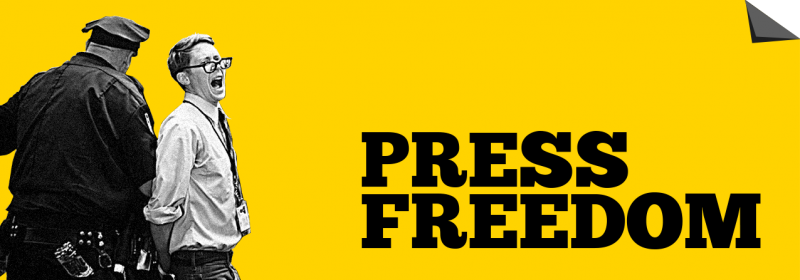FIGHT WAR FOR CORRUPTION & HUMAN RIGHTS (F C H)
(Vision: Fight war for corruption & human rights for a better human life.)
Si buscas
hosting web,
dominios web,
correos empresariales o
crear páginas web gratis,
ingresa a
PaginaMX
Por otro lado, si buscas crear códigos qr online ingresa al Creador de Códigos QR más potente que existe


Press freedom in the digital age: new threats, new challenges
20 Dec 13 - 08:25
 Press freedom in the digital age: new threats, new challenges...................As growing portions of journalistic activity take place on the Internet, Europe has not become a safer place for those expressing critical opinions. Clearly, people reporting can reach out faster and to a broader audience than before. But old and new threats await them when they decide to do so: violence, intimidation, prosecution for lawful speech, judicial harassment and surveillance of those reporting continue unabated in the digital era, including in Europe.
Press freedom in the digital age: new threats, new challenges...................As growing portions of journalistic activity take place on the Internet, Europe has not become a safer place for those expressing critical opinions. Clearly, people reporting can reach out faster and to a broader audience than before. But old and new threats await them when they decide to do so: violence, intimidation, prosecution for lawful speech, judicial harassment and surveillance of those reporting continue unabated in the digital era, including in Europe.Every day, the Internet carries free expression in the public interest to people around Europe and elsewhere. This is the way in which, for instance, more and more people become aware of corruption, maladministration, unethical behaviour by public officials and businesses, and serious human rights violations. Bloggers, reporting citizens and others have therefore joined traditional journalists in the ranks of those who are at risk of retaliation by state authorities or interest groups (e.g., organized crime, rival ethnic or religious groups).
Digital speech, real threats
These threats are real. While in Baku in November 2012, I visited Vugar Gonagov, executive director of Khayal TV, in pre-trial detention. Together with three others, he had been arrested in March 2012 and charged with mass disorder after he had posted online a video of a regional governor making derogatory remarks about local citizens. Last year in Russia, Dmitry Shipilov was sentenced to 11 months of correctional labour for “insulting a state official in public” following the publication on his blog of articles which were critical of local politicians.
Work to ensure the protection and safety of journalists must be strengthened. But protection must be as inclusive as possible, including not only journalists (in the formal sense), but all those reporting in the public interest. According to the case-law of the Strasbourg Court, the justification for enhanced protection of freedom of expression is the nature of the information imparted, rather than the position of the person imparting this information.
Why Human Rights matter online
The Strasbourg Court has also found that member states are under a positive obligation to create an appropriate regulatory framework to ensure the effective protection of journalists’ freedom of expression on the Internet.
However, in many cases member states appear to be doing exactly the opposite. The relatively recent nature of the Internet and the rapid evolution of technology appear to have created a space whereby free speech can in practice be limited further than is allowed by international standards.
Arbitrary filtering and blocking and unjustified surveillance are typical illustrations of this unfortunate trend. Coupled with prosecution for legitimate online speech, these practices jeopardise the status of the Internet as an open space, without which no sustainable protection of journalists and other critical voices can be ensured.
The Strasbourg Court provides an invaluable bulwark to efforts to counter this state of affairs. In its first case on Internet blocking last December, the Court found Turkey in violation of Article 10 (freedom of expression) of the European Convention on Human Rights. It found notably that measures restricting access to Internet content must be based on a law that is precise enough and that offers sufficient opportunities for judicial review. In addition, domestic courts must examine whether the blocking measure is necessary, and in particular whether it is targeted enough so as to impact only on the specific content that requires blocking.
What needs to be done
We should make no artificial distinctions between the exercise of freedom of expression online and offline. The new and diffuse nature of the Internet should never be taken as pretext for introducing new limitations to the exercise of fundamental rights and freedoms, including the right to receive and impart information.
Proportionality and judicial oversight appear as two particularly key principles that should be systematically applied when looking at issues such as restricting access to Internet content or carrying out surveillance on the Internet activities of specific individuals.
We need to reaffirm the State’s primary responsibility for protecting these freedoms. At the same time, given the role played by the different stakeholders in governance of the Internet, we must pursue a dialogue with all actors involved, including the industry, to ensure that this is done. Only then can the free flow of Internet news be ensured.
Tu Sitio Web Gratis
© 2025 FIGHT WAR FOR CORRUPTION & HUMAN RIGHTS (F C H)![]()
![]()
![]()
![]()
![]()
![]()
![]()


Add a comment